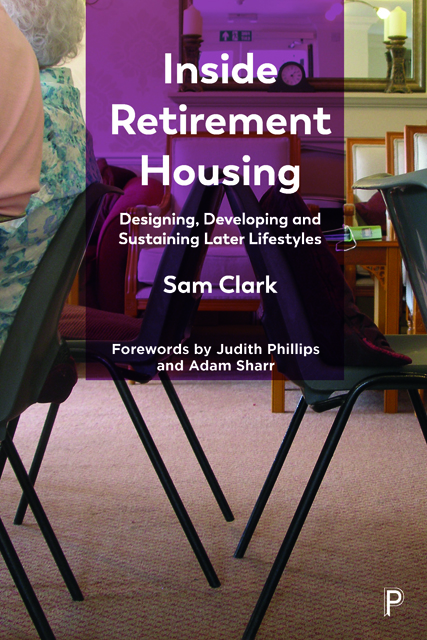9 - Professional context
Published online by Cambridge University Press: 20 June 2023
Summary
Part III focuses on professional actors in the field of retirement housing and presents contrasting positions of architecture students, as prospective professionals; architects providing in-house professional services to property developers; and town planners working as ‘public servants’ within local planning authorities, making professional judgements on proposals for specialist housing schemes. What unites them is their professional standing, insomuch that they have specialist knowledge and skills acquired through extensive training, and they belong to a ‘disciplined group of individuals who adhere to ethical standards’ (Australian Council of Professions [ACoP], 2003).
The typical route to becoming a qualified architect in the UK involves five years’ study at university – usually a three years’ Bachelor’s degree and two years’ Master’s degree accredited by the Royal Institute of British Architects (RIBA) – and completion of a minimum of two years’ practical experience under the supervision and mentorship of an architect. The latter culminates in a professional exam after which architectural assistants can apply to register as an architect with the Architects Registration Board (ARB). Similarly, to work as a town planner in the UK you need a degree or postgraduate qualification accredited by the Royal Town Planning Institute (RTPI). To become a chartered town planner, you apply via one of four recognised routes to Assessment of Professional Competence (APC); typically a minimum of two years’ planning experience is required. Both registered architects and chartered town planners must comply with an independent code of professional conduct, hold professional indemnity insurance and undertake continuing professional development (CPD) throughout their careers to ensure their knowledge remains up to date. A key attribute of this professional status – arguably one that separates these professionals from businesspersons, construction contractors and tradespersons – is adherence to an ethical code of conduct that requires ‘behaviour and practice beyond the personal moral obligations of an individual’, specifically in ‘respect to the services provided to the public’ (ACoP, 2003). The RTPI Code of Professional Conduct makes explicit that the institute ‘exists to advance the science and art of planning for the benefit of the public’ (RTPI, 2016).
Within this context professional ethics are applied irrespective of commercial and/or personal interests, helping to ensure certain quality standards for the design of the built environment, including spaces between buildings, often referred to as ‘public realm’.
- Type
- Chapter
- Information
- Inside Retirement HousingDesigning, Developing and Sustaining Later Lifestyles, pp. 161 - 163Publisher: Bristol University PressPrint publication year: 2022



